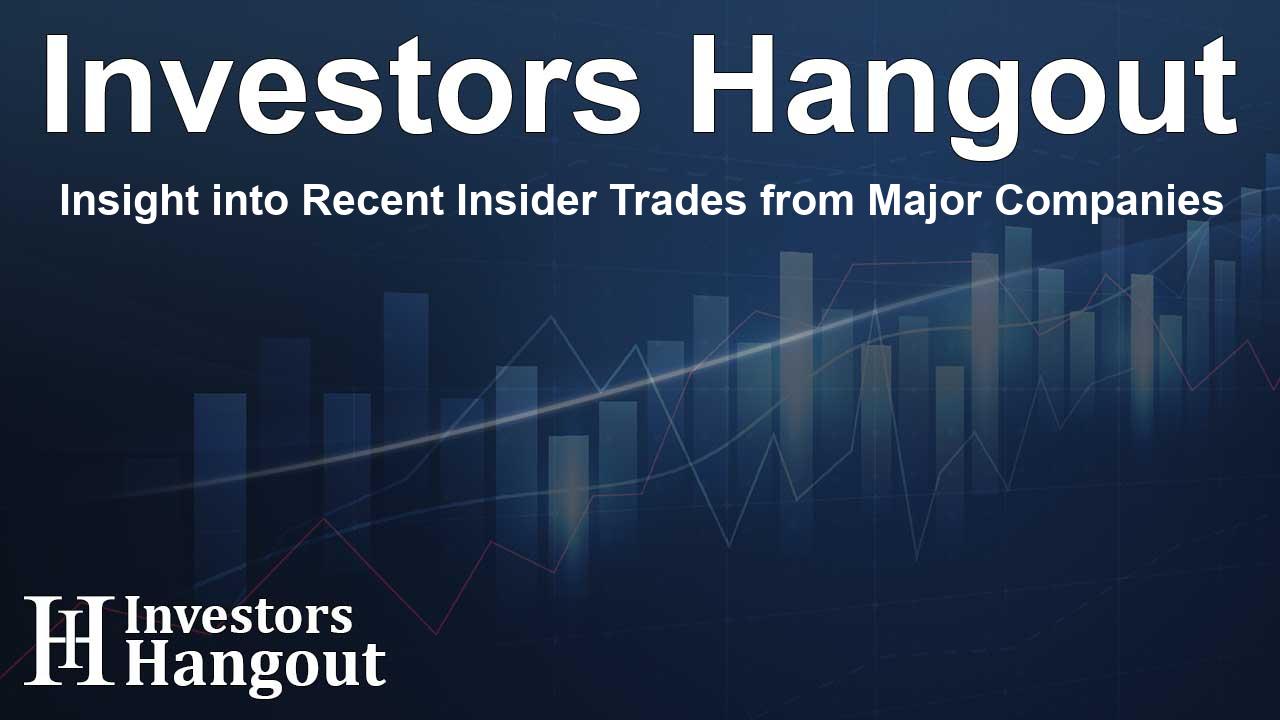Insight into Recent Insider Trades from Major Companies

Understanding Recent Insider Trades Among Major Companies
The financial market saw the Nasdaq 100 closing higher by over 150 points during a recent trading session. This movement has attracted attention, particularly regarding some significant insider trades made by executives of major corporations.
Insider Sales: What Do They Indicate?
When executives sell their shares, the reasoning behind these transactions can be multifaceted. Sometimes, these sales are pre-planned, aligning with personal financial strategies. However, in other instances, it may signal a lack of confidence in the company's future or an assessment that the current stock price is too high. While it's crucial not to base investment or trading decisions solely on these sales, they can certainly offer additional insight into market sentiments.
Dell Technologies: A Significant Trade
Dell Technologies Inc. has attracted attention following a significant sale by its CEO, Michael S. Dell. He sold approximately 3,397,465 shares at an average price of $106.37, resulting in around $361.4 million from this transaction. This notable sale may reflect his outlook on the company's current valuation.
Dell's Current Market Position
Analyst Mehdi Hosseini initiated coverage on Dell with a Neutral rating, suggesting a price target of $120. Dell continues to be a mainstay in the IT sector, focusing on providing hardware solutions to a diverse range of enterprises.
Alphabet's Recent Insider Transactions
Alphabet Inc., the parent company of Google, has also seen significant insider trading activity. Amie Thuener O’Toole, the Chief Accounting Officer, sold 2,835 shares at an average price of $151.53. This transaction generated approximately $429,588 in proceeds.
Alphabet's Market Dynamics
Analyst Gil Luria has recently rated Alphabet with a Neutral outlook and set a price target of $170. The continuous growth of Google as a leading internet company contributes to Alphabet’s strong market presence and diverse portfolio.
NVIDIA's Recent Executive Sales
NVIDIA Corporation has been in the spotlight with its CEO, Jen Hsun Huang, selling a total of 240,000 shares at an average price of $104.35, yielding around $25 million. This sale coincides with reports that U.S. antitrust regulators are investigating NVIDIA's potential dominance in the AI chip sector, adding further interest around this major player in technology.
NVIDIA's Position in the Market
As a recognized leader in graphics processing units (GPUs), NVIDIA has diversified its applications beyond gaming. GPUs are crucial in various sectors, including data centers and machine learning, highlighting the company's pivotal role in technology advancement.
Bank of America: Insider Trading Insights
Bank of America Corporation has reported a significant insider trade executed by Warren E. Buffett, who sold 5,797,093 shares at an average price of $39.45, netting approximately $228.7 million. This transaction prompts a closer evaluation of insider sentiment, especially concerning the bank's recent initiatives.
Bank of America's Current Strategy
Recently, Bank of America announced an increase in its U.S. minimum hourly wage to $24, moving towards a goal of $25 by 2025. As one of the largest financial institutions in the U.S. with over $3 trillion in assets, the company's growth strategy remains a focal point for industry analysts.
Conclusion: The Importance of Paying Attention to Insider Trades
Insider trading activity often reveals key insights into the perceptions and strategic considerations of a company’s top executives. While these transactions should not be the sole basis for any investment decision, they provide a window into the operational mindset of a company’s leadership. By monitoring such activities, investors can gain a better understanding of market trends and potential shifts in company performance.
Frequently Asked Questions
What does insider trading mean?
Insider trading involves the buying or selling of a company's stock by someone who has non-public, material information about that stock, often indicating executive confidence or concerns.
Why do executives sell their shares?
Executives may sell shares for various reasons, including financial planning, tax considerations, personal liquidity needs, or concerns about stock valuations.
How does insider trading affect stock prices?
Insider trading can influence stock prices as it may signal confidence or lack thereof in the company's future performance, prompting investors to react based on these insights.
Are all insider sales negative signals?
No, insider sales are not inherently negative. They can be pre-planned and part of an executive’s diversified financial strategy.
What companies were discussed in the article?
The article discusses insider trading activities at Dell Technologies, Alphabet Inc., NVIDIA Corporation, and Bank of America Corporation.
About Investors Hangout
Investors Hangout is a leading online stock forum for financial discussion and learning, offering a wide range of free tools and resources. It draws in traders of all levels, who exchange market knowledge, investigate trading tactics, and keep an eye on industry developments in real time. Featuring financial articles, stock message boards, quotes, charts, company profiles, and live news updates. Through cooperative learning and a wealth of informational resources, it helps users from novices creating their first portfolios to experts honing their techniques. Join Investors Hangout today: https://investorshangout.com/
Disclaimer: The content of this article is solely for general informational purposes only; it does not represent legal, financial, or investment advice. Investors Hangout does not offer financial advice; the author is not a licensed financial advisor. Consult a qualified advisor before making any financial or investment decisions based on this article. The author's interpretation of publicly available data shapes the opinions presented here; as a result, they should not be taken as advice to purchase, sell, or hold any securities mentioned or any other investments. The author does not guarantee the accuracy, completeness, or timeliness of any material, providing it "as is." Information and market conditions may change; past performance is not indicative of future outcomes. If any of the material offered here is inaccurate, please contact us for corrections.